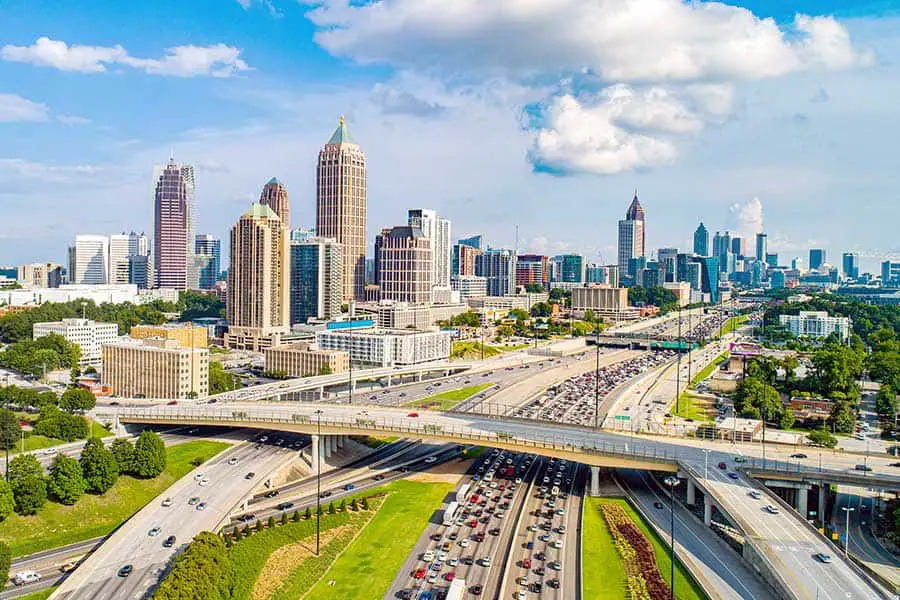
When most people think of bad traffic, their mind usually goes to cities like New York and Los Angeles. However, Atlanta takes the crown for the worst roadways in the South. So, if you are preparing for a trip, you might want to know if it’s hard to drive in Atlanta?
Driving through the City of Atlanta isn’t much more difficult than driving in most major cities. However, it can be overwhelming for drivers unprepared for busy freeways, long traffic jams, and a sprawling network of highways. So plan your route ahead of time, use your GPS, and avoid rush hour.
Whether you are looking to visit for work, vacation, or are just passing through, it’s essential to know what to expect on the roadways of Atlanta. Continue reading to understand why many people consider Atlanta to have some of the worst traffic conditions in the country and how to avoid any significant problems.
Driving in Atlanta – What You Need to Know
Driving in Atlanta is no easy challenge, especially for people who are unfamiliar with driving in major cities. In addition, there are unique conditions that contribute to the city’s infamously grueling rush hour.
The population is a significant factor since Atlanta is the 9th largest metropolitan area in the United States. Unfortunately, as the population has grown, infrastructure has not been able to keep up. While other cities around the country have expanded their public transportation networks, Atlanta’s MARTA train only reaches limited areas within the city. For this reason, most people tend to drive when they need to go somewhere, causing major traffic congestion.
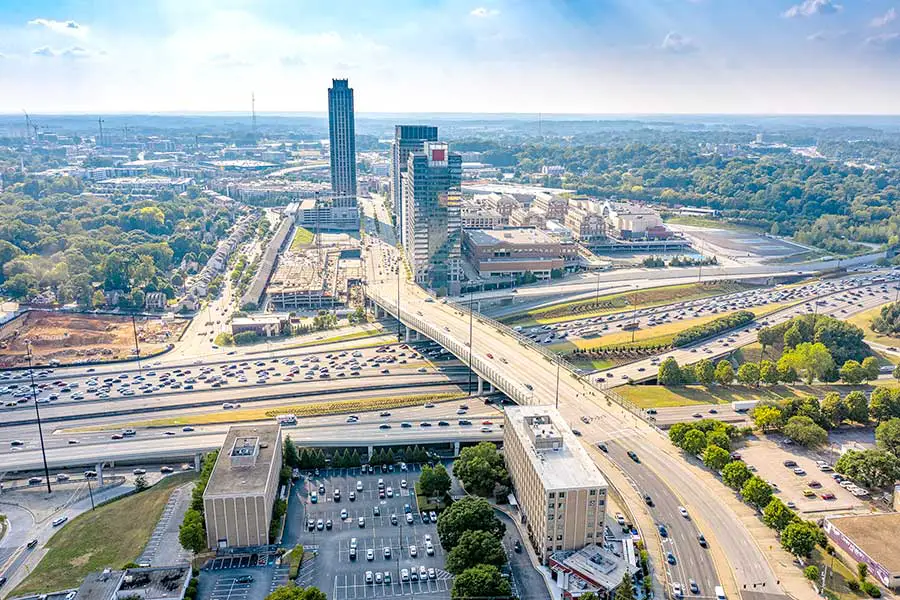
The city has an expansive network of highways that radiate from downtown Atlanta. Since most feed into downtown or the I-285 (which encircles the city), there are numerous points where bottlenecks can occur. For example, one study found that out of 20 of the worst bottlenecks in the US, five are in Atlanta.
Accidents are another big problem. Atlanta is ranked 16th in the nation for the number of accidents. Each year, over 30,000 accidents get reported to the Atlanta Police Department. So even if you may not be directly involved, accidents can back up traffic for many miles.
While driving can be tricky, you’ll find that Atlanta’s roadways are pretty well maintained and highways and streets are well marked, making navigating easier. You also won’t encounter any toll roads in Atlanta (except for the I-85 Express Lanes).
Fortunately, you can take some measures to make driving in Atlanta much easier. First, always consider the time of day when driving through or around the city. Arranging your trip at certain times of day can help you avoid most major traffic jams. Also, using a GPS device can help with navigating the sometimes confusing network of roads and highways. A GPS can also help you avoid traffic congestion.
What Time is Rush Hour in Atlanta?
Atlanta rush hour coincides with the standard times that people are commuting to and from work. Traffic in some areas begins to stack up as early as 4 AM and can last until 10 AM, with the peak morning rush happening between 6 and 7 AM. In the evenings, traffic is the worst between 3:30 PM and 7:30 PM. It’s highly recommended that you avoid driving during these times unless you enjoy sitting in bumper-to-bumper traffic.
Traffic is more forgiving on the weekends. Typically, you won’t see major congestion unless there is a big sports event happening (Braves, Falcons, etc.). However, be mindful that accidents can cause congestion at any time.
Road Trip Answers Fun Fact: There are 68 streets throughout the city of Atlanta that have the word “Peachtree” in their name.
Other Posts of Interest
- Is Skyline Drive The Same As Blue Ridge Parkway?
- Does US Highway 50 Go Coast To Coast?
- Can You Drive Through Death Valley?
- Can A U.S. Citizen Drive To Alaska Without A Passport?
What is Parking Like in Atlanta?
Parking is relatively easy to find in Atlanta. The city has approximately 2,400 paid parking spots in addition to parking garages and lots throughout the city. Typically, the closer you are to downtown, the more difficult it will be to find a parking spot. Most major venues and hotels will have their own parking lots.
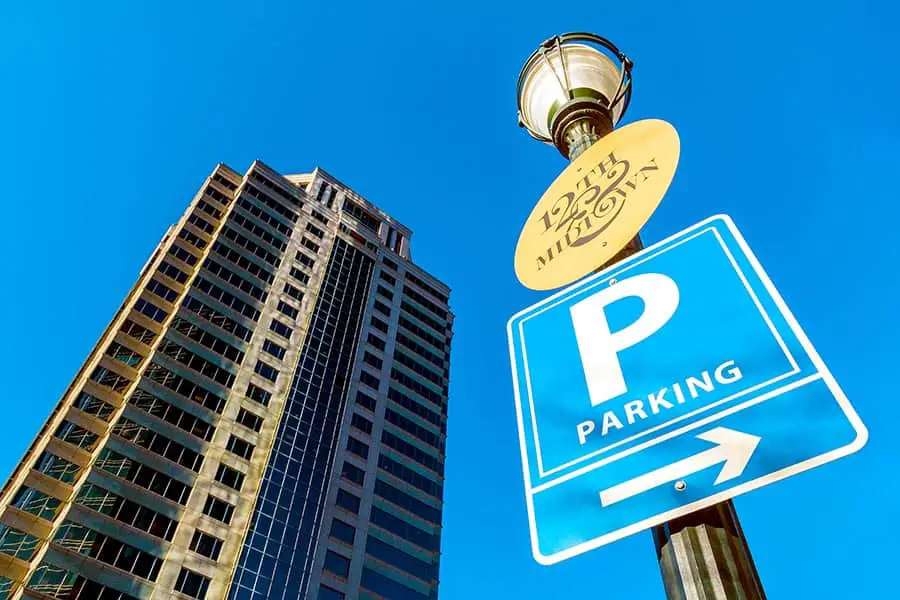
The cost of parking is relatively low compared to other major cities in the United States. You can expect to spend between $4 to $6 per hour for parking.
If you are looking for free parking, you can find this at some MARTA stations (here is a list of free parking lots available on their website). Parking is also free on Sundays or major holidays.
No matter what, take care to make sure that you are parked legally. The cost of parking tickets can vary but generally cost about $25.
Why Is There So Much Traffic in Atlanta?
Most traffic jams in Atlanta can be attributed to a combination of large populations, poor freeway designs, insufficient public transportation, and car accidents.
First, the city is home to a population of over 6 million people, the ninth-largest metropolitan area in the United States. The public transportation system is extremely limited and only reaches select parts of the city. For this reason, 75% of the workforce needs to drive to work. And people who are planning to visit Atlanta will most likely need a car.
The design of roadways is a challenge as well. There are several major highways that converge to form bottlenecks for traffic entering and exiting the city. One of the worst spots is the 7.5-mile stretch where I-20, I-75, and I-85 converge. Also, there are very few service roads that keep traffic on freeways for longer periods of time.
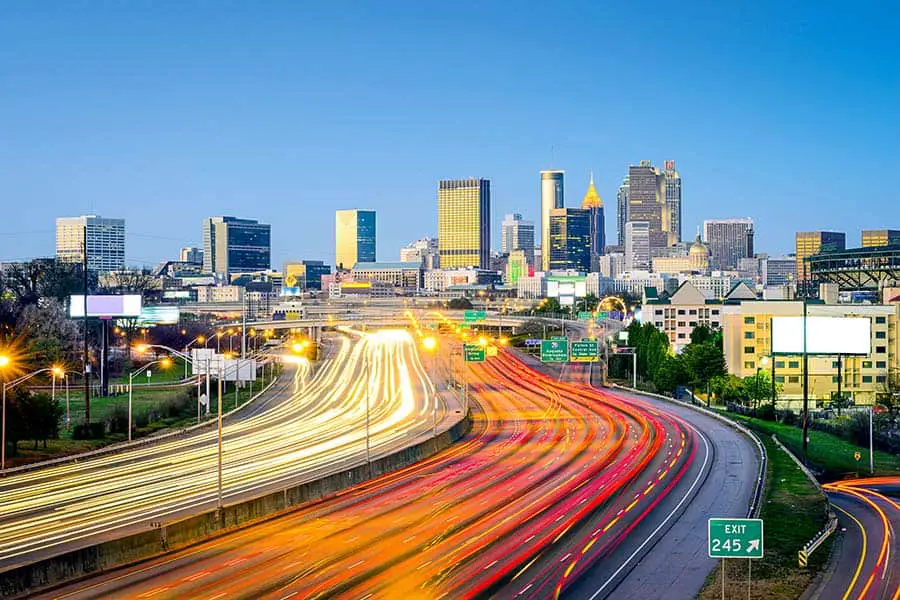
What is the Best Time to Drive Through Atlanta?
The drive through Atlanta will only take about 20 minutes in good traffic. This same drive can take 3 to 4 times longer during rush hour. The best time to drive through Atlanta will be outside of normal rush hours or on the weekends.
What is the Best Route Through Atlanta?
There is no single best route through Atlanta, depending on the direction you are headed or time of day. However, you can check traffic conditions ahead of time by calling 511 or using the G Dot App (provided by the Georgia Department of Transportation) for traffic hotspots.
Of course, with today’s technology, your GPS or wayfinding app (Apple Maps or Waze) will be your best friend. Not only will your GPS select the most efficient route, but it will automatically detour you if conditions change.
Is it Safe to Drive Through Atlanta?
It’s generally safe to drive anywhere in Atlanta. While there are some pockets of bad neighborhoods, they are typically far away from any major attractions or popular areas. Avoid any rough-looking neighborhoods, especially at night.
Fortunately, most freeways bypass these areas, so you shouldn’t have to worry. You may encounter some angry drivers on the road, which is typical in any big city like Chicago or Los Angeles. It’s best just to let them pass and go about your drive.
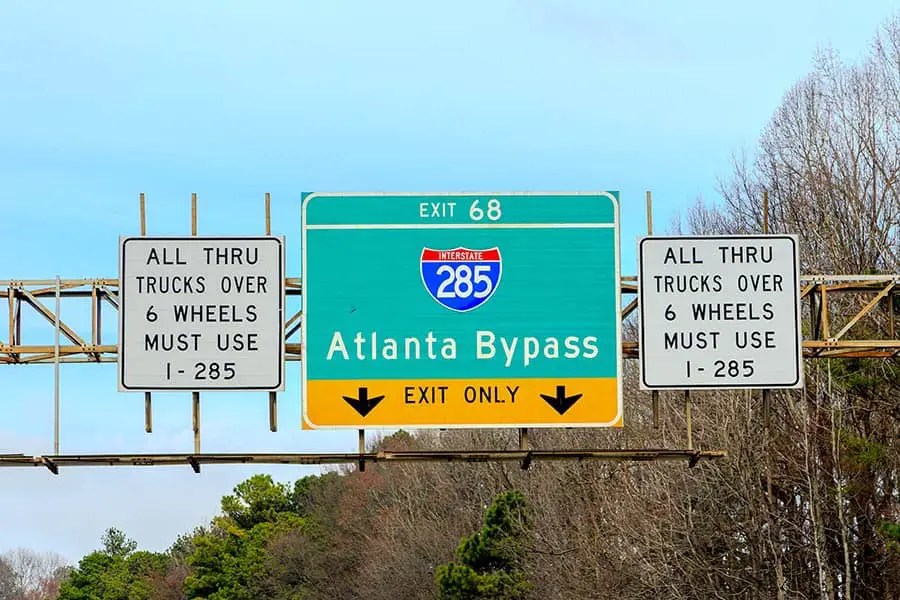
Is I-285 Better Than I-75 Through Atlanta?
Most people who are just passing through Atlanta take I-285 or I-75. I-75 is the most direct path across the heart of Atlanta, while I-285 wraps around Atlanta. Which route you take will depend on current traffic conditions and the time of day. Most people advise staying on I-75. However, if you do take I-285, the western side usually has less traffic.
What is the Best Bypass Around Atlanta?
I-285 is usually the best route to bypass downtown Atlanta. However, this freeway can still get really congested and cause you delays on your trip.
The good news is that the northern part of Georgia is crisscrossed with numerous different highways and interstates. Therefore, you will have many options to avoid Atlanta altogether, depending on your direction.
Getting the Best Driving Experience in Atlanta
While driving in Atlanta can be nerve-wracking and infuriating at times, having a plan can completely change your driving experience. You can reduce your stress by leaving early and carefully planning the time and route that you drive. Then, if you do get stuck in traffic, just sit back and take the opportunity to listen to your favorite music or podcast.





